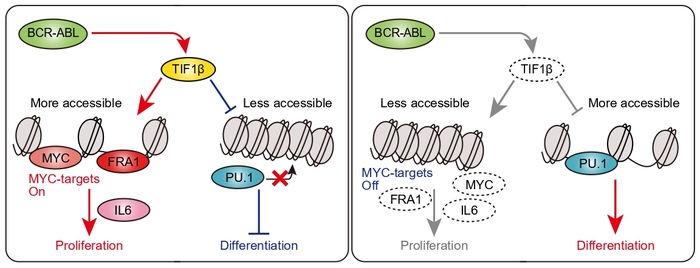- HOME
- News & Events
- Publications
- 【Publications】TIF1β activates leukemic transcriptional program in HSCs and promotes BCR::ABL1-induce...
Publications
【Publications】TIF1β activates leukemic transcriptional program in HSCs and promotes BCR::ABL1-induced myeloid leukemia
June 18 2024
Lab: Goro Sashida
Paper information
Tile:
TIF1β activates leukemic transcriptional program in HSCs and promotes BCR::ABL1-induced myeloid leukemia
Mariko Morii, Sho Kubota, Mihoko Iimori, Takako Yokomizo-Nakano, Ai Hamashima, Jie Bai, Akiho Nishimura, Masayoshi Tasaki, Yukio Ando, Kimi Araki, Goro Sashida
Leukemia May 24, 2024 38(6) 1275-1286 DOI: 10.1038/s41375-024-02276-w.
Highlights
- TIF1β opened chromatin and activated the transcription of oncogenes in BCR::ABL1-expressing stem cells.
-
The loss of Tif1β sensitized the BCR::ABL1 leukemic cells to the TKI treatment.
Abstract:
TIF1β/KAP1/TRIM28, a chromatin modulator, both represses and activates the transcription of genes in normal and malignant cells. Analyses of datasets on leukemia patients revealed that the expression level of TIF1β was increased in patients with chronic myeloid leukemia at the blast crisis and acute myeloid leukemia. We generated a BCR::ABL1 conditional knock-in (KI) mouse model, which developed aggressive myeloid leukemia, and demonstrated that the deletion of the Tif1β gene inhibited the progression of myeloid leukemia and showed longer survival than that in BCR::ABL1 KI mice, suggesting that Tif1β drove the progression of BCR::ABL1-induced leukemia. In addition, the deletion of Tif1β sensitized BCR::ABL1 KI leukemic cells to dasatinib. The deletion of Tif1β decreased the expression levels of TIF1β-target genes and chromatin accessibility peaks enriched with the Fosl1-binding motif in BCR::ABL1 KI stem cells. TIF1β directly bound to the promoters of proliferation genes, such as FOSL1, in human BCR::ABL1 cells, in which TIF1β and FOSL1 bound to adjacent regions of chromatin. Since the expression of Fosl1 was critical for the enhanced growth of BCR::ABL1 KI cells, Tif1β and Fosl1 interacted to activate the leukemic transcriptional program in and cellular function of BCR::ABL1 KI stem cells and drove the progression of myeloid leukemia.
Graphical abstract

